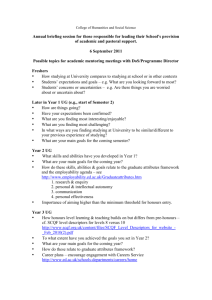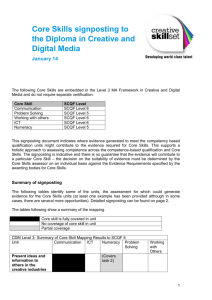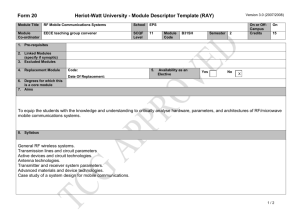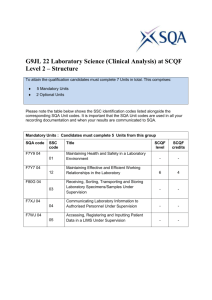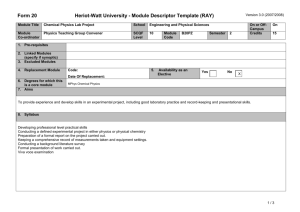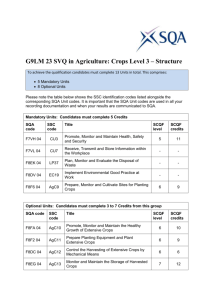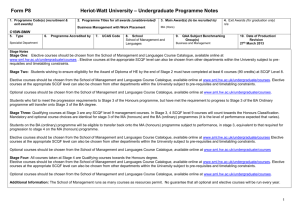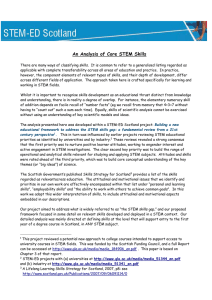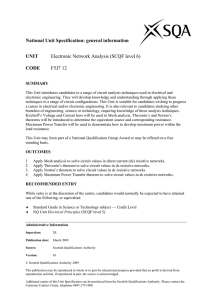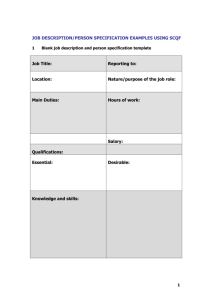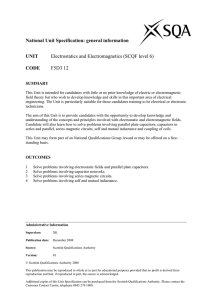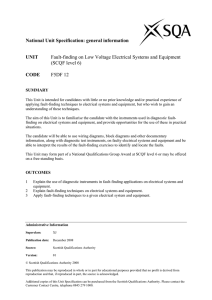BUSN11009 - WordPress.com
advertisement
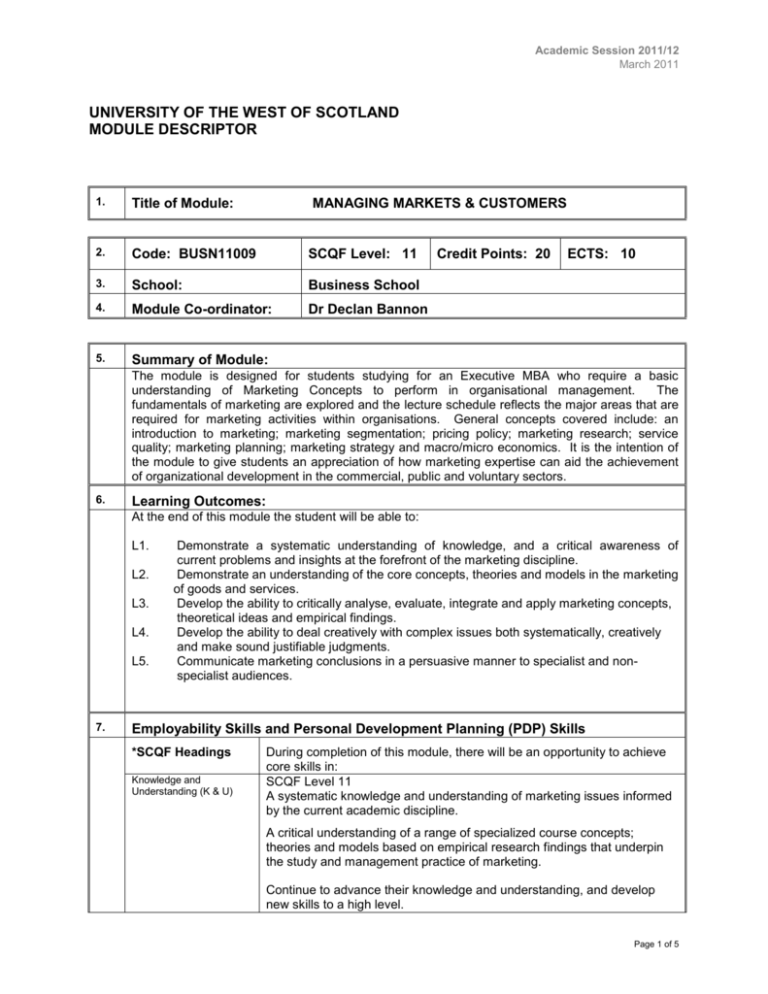
Academic Session 2011/12 March 2011 UNIVERSITY OF THE WEST OF SCOTLAND MODULE DESCRIPTOR 1. Title of Module: 2. Code: BUSN11009 SCQF Level: 11 3. School: Business School 4. Module Co-ordinator: Dr Declan Bannon 5. Summary of Module: MANAGING MARKETS & CUSTOMERS Credit Points: 20 ECTS: 10 The module is designed for students studying for an Executive MBA who require a basic understanding of Marketing Concepts to perform in organisational management. The fundamentals of marketing are explored and the lecture schedule reflects the major areas that are required for marketing activities within organisations. General concepts covered include: an introduction to marketing; marketing segmentation; pricing policy; marketing research; service quality; marketing planning; marketing strategy and macro/micro economics. It is the intention of the module to give students an appreciation of how marketing expertise can aid the achievement of organizational development in the commercial, public and voluntary sectors. 6. Learning Outcomes: At the end of this module the student will be able to: L1. L2. L3. L4. L5. 7. Demonstrate a systematic understanding of knowledge, and a critical awareness of current problems and insights at the forefront of the marketing discipline. Demonstrate an understanding of the core concepts, theories and models in the marketing of goods and services. Develop the ability to critically analyse, evaluate, integrate and apply marketing concepts, theoretical ideas and empirical findings. Develop the ability to deal creatively with complex issues both systematically, creatively and make sound justifiable judgments. Communicate marketing conclusions in a persuasive manner to specialist and nonspecialist audiences. Employability Skills and Personal Development Planning (PDP) Skills *SCQF Headings Knowledge and Understanding (K & U) During completion of this module, there will be an opportunity to achieve core skills in: SCQF Level 11 A systematic knowledge and understanding of marketing issues informed by the current academic discipline. A critical understanding of a range of specialized course concepts; theories and models based on empirical research findings that underpin the study and management practice of marketing. Continue to advance their knowledge and understanding, and develop new skills to a high level. Page 1 of 5 Academic Session 2011/12 March 2011 Practice: Applied Knowledge and Understanding SCQF Level 11 Use a significant range of practical skills, techniques associated with the practice of marketing management. Show a comprehensive understanding of techniques applicable to marketing management. Demonstrate originality in the application of knowledge, together with a practical understanding of how established techniques of research and enquiry are used to create and interpret knowledge in marketing management. Plan and execute the development of a marketing plan based on theory, research and best practice. Generic Cognitive Skills Communication, ICT and Numeracy Skills Autonomy, Accountability and Working with others 8. Pre-requisites: SCQF Level 11 Deal with complex issues both systematically and creatively, whilst making rigorous, robust judgments in the absence of complete data. SCQF Level 11 Communicate strategic conclusions in a persuasive manner to specialist and nonspecialist audiences. SCQF Level 11 Demonstrate self-direction and originality in tackling and solving problems, and act autonomously in planning and implementing tasks at a professional and equivalent level. Before undertaking this module the student should have undertaken the following: Module Code: N/A Module Title: N/A N/A Module Title: N/A Other: Co-requisites: 9. Module Code: Learning and Teaching: Learning Activities/Categories: During completion of this module, the learning activities undertaken to achieve the module learning outcomes are stated below: Student Learning Hours (Normally totaling 200 hours): Workshops 15 Project work 30 Preparation for presentation and/or coursework assignment 60 Independent study and revision 93 Examination 10. Total Hours Assessment (Note: Learning hours include both contact hours and hours spent on other learning activities) 3 200 Hours Total Assessment will be based on a written assignment (40%), a discussion thread (10%) and a written examination (50%). 11. Equality and Diversity The module is appropriate for all students meeting the academic pre-requisites regardless of ethnic minority, disabled students, different ages, genders, religions, sexual orientations and other under-represented groups. Facilities and resources for special needs students are available and are flexible to the students needs. Page 2 of 5 Academic Session 2011/12 March 2011 12. **Indicative Resources: (eg. Core text, journals, internet access) The following materials form essential underpinning for the module content and ultimately for the learning outcomes: Baines, P.; Fill, C. and Page, K. (2011) Marketing, 2 nd Edition Oxford Brassington & Pettit (2007) Principles of Marketing 4th edition FT Prentice Hall Wood, M. (2011) The Marketing Plan Handbook, 4th Edition, Pearson, NJ. Jobber, D. (2007), ‘Principles & Practice of Marketing’, 5th Edition (McGraw Hill) Lambin, J-J. (2009) Marketing Driven Management, 3nd Edition, London, McMillan. Martin-Fagg, R. (1996) Making Sense of the Economy, London, Thomson. On-line academic journals. Philip Kotler and Gary Armstrong (2010) Principles of Marketing, 13 ed., Prentice-Hall Eagan, J. (2011) Relationship Marketing, 4th Edition, FT Prentice Hall. Baron, S; Conway, A. and Wanaby, G. (2010) Relationship Marketing, Sage. Godson, M. (2009) Relationship Marketing, FT Prentice Hall. Economist OTHER TEXTS: that you can use to supplement your knowledge include: Drummond and Ensor, “Strategic Marketing”, Planning and Control, Butterworth-Heinemann 2001. Wood M, ‘Marketing Planning principles into Practice’ FT, Prentice Hall 2004 Mintzberg H, Ahlstrand B and Lampel J, ‘Strategy Bites Back’, Pearson 2004 Piercy, N., ‘Market-led Strategic Change’, Harper Collins. Hamel, Gary 2000 Leading the Revolution, Boston, Harvard Business School Press Kotler et al., 1999, “Principles of Marketing”, Market Information and Market research, Chapter, 8, Prentice Hall Europe. SUGGESTED JOURNALS European Journal of Marketing Marketing Intelligence and Planning Journal of Consumer Marketing Journal of Applied Marketing Practice: Applied Marketing Science Journal of Strategic Marketing 13. Attendance Requirements Normal Attendance rules apply. Refer to Regulation 5.7 for further details. 14 Campus(s) for Module Delivery The module will normally be offered on the following campuses / or by Distance Learning (D/L) (ie.Virtual Campus): (Provided viable student numbers permit) Page 3 of 5 Academic Session 2011/12 March 2011 Paisley: Crichton: Hamilton: D/L Virtual Campus: (Please specify) Other: D/L Virtual Campus: (Please specify) Trimester 3 No Tick 15. Ayr: Course Reference Numbers (CRNs) (if known) Paisley: Ayr: Crichton: Hamilton: Other: Enter 16. 11/12 Trimester(s) for Module Delivery Trimester 1 (Session 2011/12) Yes Trimester 2 (Session 2011/12) No (Session 2011/12) Page 4 of 5 Academic Session 2011/12 March 2011 For Internal Use Only 17. Subject Development Group (SDG) MEEET 18. Assessment Results (Pass / Fail) No 19. Subject Panel Marketing Postgraduate 20. Moderator tba 21. External Examiner David Crick 22. Accreditation Details N/A 23. Changes / Version Number 03/2011 ASSESSMENT CATEGORY 1 Learning Outcome (Identified in Section 6) ASSESSMENT CATEGORY 2 Learning Outcome (Identified in Section 6) ASSESSMENT CATEGORY 3 Assessment Outcomes Grids (referred to within Section 10) Learning Outcome (Identified in Section 6) Formal Written Examination Written Assignment Discussion threads Learning Outcome (1) Learning Outcome (2) Learning Outcome (3) Learning Outcome (4) Learning Outcome (5) Learning Outcome (1) Learning Outcome (2) Learning Outcome (3) Learning Outcome (4) Learning Outcome (5) Learning Outcome (1) Learning Outcome (2) Learning Outcome (3) Learning Outcome (4) Weighting (%) of Assessment Element Timetabled Contact Hours 50% 3 Weighting (%) of Assessment Element Timetabled Contact Hours 40% Learning Outcome (5) Combined Total for All Assessment Categories N/A Weighting (%) of Assessment Element Timetabled Contact Hours 10% N/A 100% Page 5 of 5
